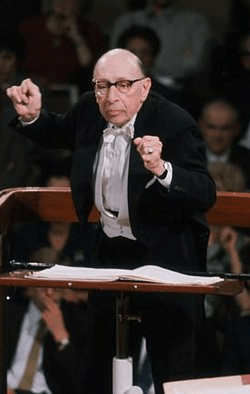
Igor Stravinsky Quotations
Igor Fyodorovich Stravinsky, considered to be the most influential music composer of modern times, was named by Time magazine as one of the 100 most influential people of the 20th century. He supplemented his royalty income by conducting, playing piano and recording his works.
Stravinsky wrote music with the craft of a fine jeweler and much of it has entered the standard repertory. His work embraced multiple compositional styles, revolutionized orchestration, spanned several genres, practically reinvented ballet form, and incorporated idioms from multiple cultures, languages, and literature. As a consequence, his influence on composers both during his lifetime and after his death was, and remains, considerable. Twentieth-century rock musician Frank Zappa and Jazz saxophonist Charlie Parker openly credit Stravinsky as a major influence.
Stravinsky displayed an inexhaustible desire to learn and explore art, literature, and life and this desire manifested itself in several of his Paris collaborations. Not only was he the principal composer for Sergei Diaghilev’s Ballets Russes, but he also collaborated with Pablo Picasso (Pulcinella, 1920), Jean Cocteau (Oedipus Rex, 1927) and George Balanchine (Apollon musagète, 1928).
His rich life has been primarily chronicled by his second wife, Vera Stravinsky, and Robert Craft, who championed Stravinsky’s later music. It may be assumed that the Stravinsky’s pet parrots grew to be among the most musically sophisticated birds of all time.
Image: Photo of composer Igor Stravinsky
“I am in the present. I cannot know what tomorrow will bring forth. I can know only what the truth is for me today. That is what I am called upon to serve, and I serve it in all lucidity.”
“I have learned throughout my life as a composer chiefly through my mistakes and pursuits of false assumptions, not by my exposure to founts of wisdom and knowledge.”
“What force is more potent than love?”
“It’s one of nature’s ways that we often feel closer to distant generations than to the generation immediately preceding us.”
“Music is given to us with the sole purpose of establishing an order in things, including, and particularly, the coordination between man and time.”
“Never look at the trombones. You’ll only encourage them.”
Igor Stravinsky was financially successful as a composer, conductor and performer of his music. Even so, Igor and his wife, Vera Stravinsky, often had money woes, partially due to providing substantial unending financial support to his adult children.
“Money may kindle, but it cannot by itself, and for very long, burn.”
Igor Stravinsky, perhaps the most influential classical music composer of the 20th century, was successful musically and financially via the royalties from his compositions and writings as well as the piano and conducting performance revenue he earned throughout his long and
prolific career.
“Just as appetite comes from eating, so work brings inspiration, if inspiration is not discernible at the beginning.”
It seems that prodigies have always enamored us humans. In an interview for London Magazine in 1967, Igor Stravinsky, one of the greatest composers of the 20th century – who wasn’t recognized for having much talent at all until he was almost thirty years old – weighed in on this issue as follows:
“I remember being handed a score composed by Mozart at the age of eleven. What could I say? I felt like de Kooning, who was asked to comment on a certain abstract painting, and answered in the negative. He was then told it was the work of a celebrated monkey. ‘That’s different. For a monkey, it’s terrific’.”
Because Igor & Vera Stravinsky had parrots in their home for many years, and these pet birds are so much like children in temperament and intelligence, it is not surprising that the birds actually understood his music best, as they had heard his pieces from inception to completed compositions.
“My music is best understood by children and animals.”
“One paradox in art, music and much of life, is that what seems like a limited medium is in reality, unlimited.”
“I know that the 12 notes in each octave and the varieties of rhythm offer me opportunities that all of human genius will never exhaust.”
– Igor Stravinsky (1882-1971)
